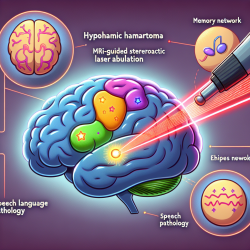Understanding the Complex Interplay of Epilepsy Treatment and Memory
The recent case study titled "Disabling amnestic syndrome following stereotactic laser ablation of a hypothalamic hamartoma in a patient with a prior temporal lobectomy?" offers valuable insights into the intricate relationship between epilepsy treatment and memory function. As practitioners, understanding these dynamics can significantly enhance our approach to treating children with epilepsy, ensuring that we make data-driven decisions that optimize their cognitive and developmental outcomes.
The Study at a Glance
The case involves a 19-year-old male with a history of intractable focal seizures and cortical dysplasia. After undergoing a right temporal lobectomy, a hypothalamic hamartoma was identified, leading to an MRI-guided stereotactic laser ablation. Unfortunately, this procedure resulted in significant memory loss due to damage to the bilateral medial mammillary bodies, highlighting the potential risks associated with dual pathology in epilepsy treatment.
Key Findings and Implications
- Hypothalamic hamartomas are rare but significant contributors to intractable epilepsy, often associated with gelastic seizures and cognitive impairments.
- MRI-guided stereotactic laser ablation is a minimally invasive technique that has shown promise in achieving seizure freedom, with an 86% success rate in a recent series of 14 patients.
- The study underscores the importance of assessing for dual pathology and understanding the potential cognitive risks associated with surgical interventions, particularly in patients with prior temporal lobectomies.
Enhancing Practitioner Skills
For practitioners, this case study serves as a critical reminder of the need for comprehensive pre-surgical evaluations. Here are some actionable steps to enhance your practice:
- Conduct Thorough Assessments: Utilize advanced imaging techniques and neuropsychological testing to identify dual pathologies and assess baseline cognitive functions.
- Collaborate with Multidisciplinary Teams: Engage with neurologists, neurosurgeons, and psychologists to develop a holistic treatment plan that considers potential cognitive outcomes.
- Monitor Post-Surgical Outcomes: Implement regular follow-ups to assess cognitive and seizure outcomes, adjusting treatment plans as necessary to support the child's development.
Encouraging Further Research
This case highlights the need for further research into the mechanisms underlying memory impairments following epilepsy surgery. By exploring the interplay between different brain regions involved in memory and seizure activity, we can develop more targeted interventions that minimize cognitive risks.
To read the original research paper, please follow this link: Disabling amnestic syndrome following stereotactic laser ablation of a hypothalamic hamartoma in a patient with a prior temporal lobectomy?










